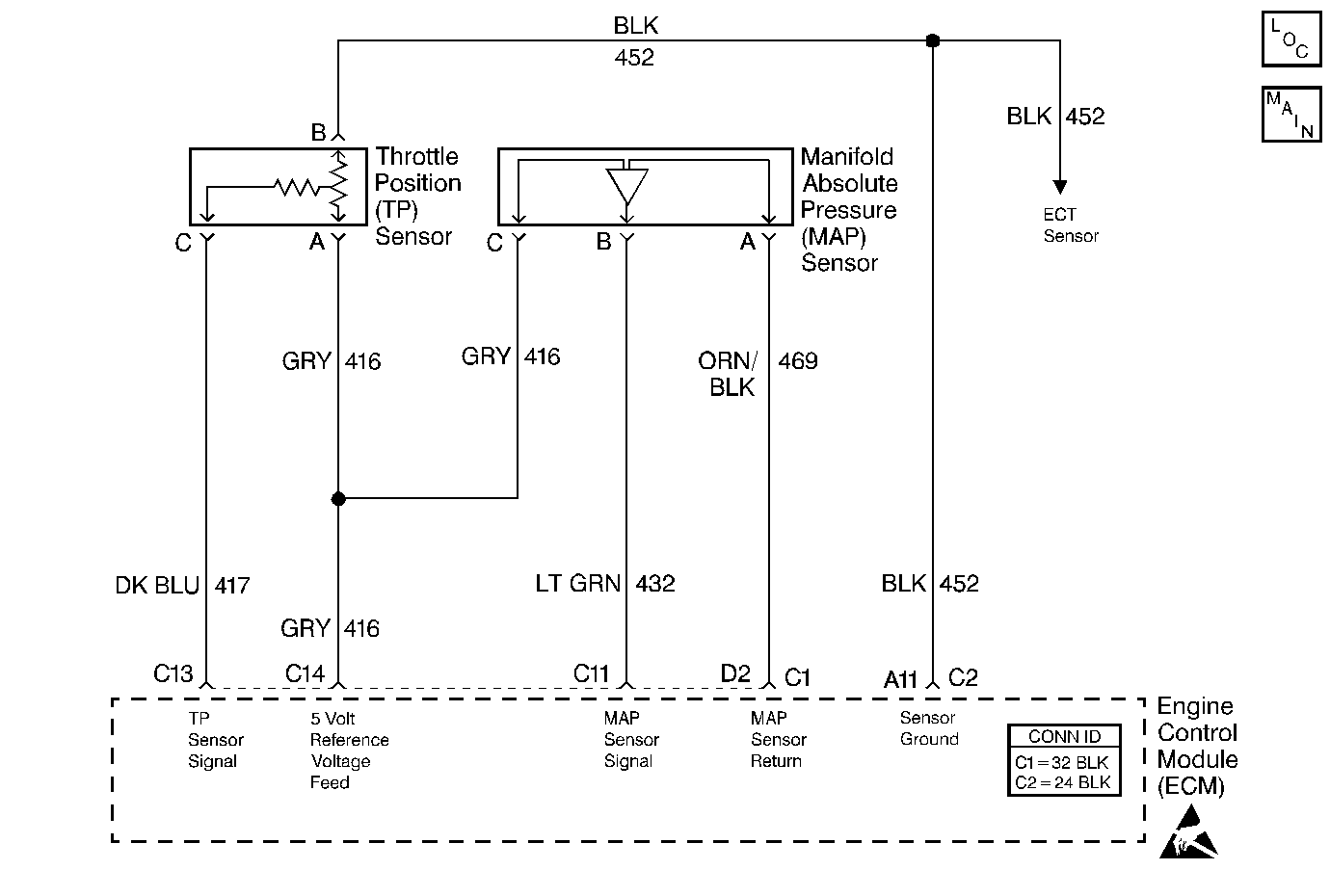
Circuit Description
The Manifold Absolute Pressure (MAP) sensor responds to changes in the manifold pressure (vacuum). The ECM receives this information as a signal voltage that will vary from about 1.0 to 1.5 volts at idle from 4.0 to 4.8 volts at a wide open throttle (low vacuum).
Conditions for Setting the DTC
| • | Engine speed less than 1,200 RPM |
| • | Manifold pressure reading less than 13 kPa, conditions met for 1 second |
Or
| • | Engine speed greater than 1,200 RPM |
| • | Throttle angle over 15% |
| • | Manifold pressure less than 13 kPa |
| • | Conditions met for 1 second |
Action Taken When the DTC Sets
If the MAP sensor fails, the ECM will substitute a fixed MAP value. The ECM uses the Throttle Position (TP) sensor in order to control the fuel delivery and turns ON the MIL (Malfunction Indicator Lamp).
Conditions for Clearing the MIL/DTC
The conditions for the fault are no longer present and 50 ignition cycles have passed with no further faults or the ignition switch is turned OFF and the battery feed voltage is removed for 10 seconds.
Diagnostic Aids
An intermittent open in the MAP signal circuit or the 5 volts reference circuit will result in a DTC 34. With the ignition ON and the engine OFF, the manifold pressure equals the atmospheric pressure and the signal voltage will be high. The ECM uses this information as an indication of vehicle's altitude.
The comparison of this reading with a known good vehicle with the same sensor is a good way in order to check the accuracy of a suspect sensor. Readings should be the same plus or minus 0.4 volt. Also the MAP Output Check can be used to test MAP sensor.
| • | Refer to Intermittent Conditions . |
| Important: Make sure electrical connector remains securely fastened. |
| • | Check all the connections. |
| • | Disconnect the sensor from the bracket, and twist the sensor by hand only in order to check for intermittent connections. Output changes greater than 0.1 volt indicates a bad connector or connection. If OK, replace sensor. |
Refer to Manifold Absolute Pressure Sensor Output Check Diagnosis for further diagnosis.
Test Description
The numbers below refer to the step numbers on the Diagnostic Table.
-
This test checks to see if DTC was set as result of a hard failure or an intermittent condition.
-
This step tests to see if the sensor is at fault for the low voltage or if there is an ECM or wiring problem.
-
This simulates a high signal voltage in order to check for an open in MAP signal circuit. If the test lamp is bright during this test, MAP signal circuit is probably shorted to a ground. If a scan tool reads over 4 volts at this test 5 volts reference circuit can be checked by measuring the voltage at terminal C (should be 5 volts).
Step | Action | Value(s) | Yes | No |
|---|---|---|---|---|
1 | Did you perform the On-Board Diagnostic (OBD) System Check? | -- | ||
Did the scan tool display the MAP voltage below the specified value immediately after starting? | 0.25 V | Go to Diagnostic Aids | ||
Does the scan tool display the MAP voltage over the specified value? | 4.7 V | |||
4 |
Did you find a problem? | -- | ||
Does the scan tool display the MAP voltage over the specified value? | 4.0 V | |||
6 |
Did you find a problem? | -- | ||
7 |
Did you find a problem? | -- | ||
8 |
Did you find a problem? | -- | ||
9 |
Did you find a problem? | -- | ||
10 |
Did you find a problem? | -- | ||
11 | Refer to Manifold Absolute Pressure Sensor Output Check Diagnosis and Manifold Absolute Pressure Sensor Replacement and repair as necessary. Is the action complete? | -- | -- | |
12 | Replace the ECM. Refer to Engine Control Module Replacement . Is the action complete? | -- | -- | |
13 |
Did the DTC reset? | -- | ||
14 | Are any DTCs stored which you have not diagnosed? | -- | Go to the Applicable DTC Table | System OK |
